Iran Claims Israel Plotted To Sabotage Missiles With Defective Parts

Iran has accused Israel of plotting to sabotage its defense industry and the production of missiles by supplying defective parts, state media reported on Thursday.

Iran has accused Israel of plotting to sabotage its defense industry and the production of missiles by supplying defective parts, state media reported on Thursday.
Thursday night, Iran’s government-controlled media announced that a major security announcement would be made in hours, but nothing was announced. Finally, on Friday Iran released a video and a short report showing hundreds of parts said to have been defective and discovered due to the vigilance of intelligence entities.
However, Iranian journalists abroad pointed out that if the parts were indeed defective and reached Iran it means the Islamic Republic spent huge sums to acquire the fake or defective black-market parts, and now wanted to turn the fiasco into an intelligence success story.
"The intelligence unit of the Defense Ministry thwarted one of the largest sabotage plots targeting Iran's missile, aviation and airspace military industry," Iranian state TV said.
"This sabotage was carried out under the guidance of the Zionist intelligence services and their agents."
There was no immediate response from Israel. There have been reports in the past of foreign intelligence organizations succeeding in supplying defective dual-use parts to Iran. In 2010, a malicious computer worm dubbed Stuxnet was discovered in Iran that worked to sabotage Iran’s nuclear program by targeting supervisory control and data acquisition. It was believed that the bug was developer by Israeli and US intelligence services.
An unnamed Iranian defense ministry official was quoted by state media as saying a network of agents sought to introduce defective parts into the production of advanced missiles.

Iran's Deputy Speaker of Parliament has drawn an analogy between Supreme Leader Ali Khamenei's role in the regime and that of a "pilot of the plane."
"The pilot determines the course, and the co-pilot must follow," said Mojtaba Zolnouri, whilst identifying President Ebrahim Raisi as the co-pilot. “If the president doesn't obey the Supreme Leader, people must pay the price,” he added.
On Wednesday, Supreme Leader Ali Khamenei commended President Ebrahim Raisi's administration for making advancements in enhancing relations with neighboring nations. Additionally, Khamenei aimed to justify the record of the Raisi administration by lauding its positive economic figures and "achievements," a stance that many experts and numerous Iranian regime politicians dismiss as political propaganda.
Zolnouri clarified that the president's identification as the nation's ‘co-pilot’ is not due to his proximity to leadership but rather from Raisi’s status among top authorities. Nevertheless, he reiterated that the leader is not subject to presidents' opinions; while officials offer views in expertise and consultation, ultimate decision-making rests with the Supreme Leader. “It's the president who must adhere to this authority,” he said, asserting that deviation from the pilot's decision is impermissible.
Regarding recent nationwide protests, Zolnouri blamed “external influences manipulating the virtual space, coupled with internal issues.” He countered the belief that such events signal the end of the Islamic Republic, asserting that “a system rooted in people's convictions remains resilient despite enemy-generated turbulence.”
The recent protests were the most widespread in the history of the Islamic Republic. The clerical regime has refused to recognize that the unrest triggered by the death in custody of a young woman in September was a genuine popular expression of dissatisfaction at the multiple crises Iran faces.
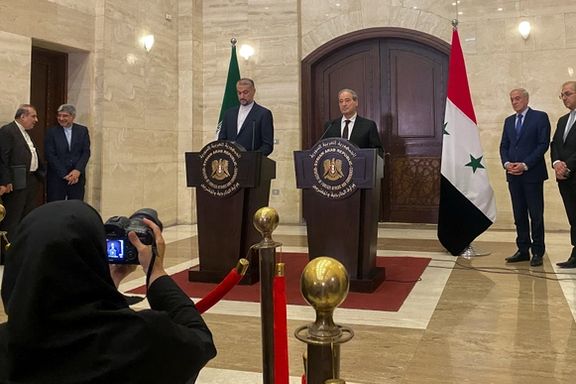
Iran’s foreign minister Hossein Amir-Abdollahian called on US forces in Syria “to return home” and leave the region to its “own people” during a visit to Damascus.
The Iranian foreign minister began a two-day visit to Syria, its close ally on Wednesday and will probably travel on to Lebanon to meet with the leadership of Hezbollah, its proxy militant group.
Unconfirmed reports earlier this month spoke of movements by US forces in Iraq and Syria possibly aimed at plugging holes on the Syrian-Iraqi border that allow Tehran to send weapons and fighters through Iraq into Syria.
Despite denials by Iraqi armed forces and the prime minister’s office, three unnamed Iraqi officials, including a leader of an armed faction stationed in northwestern Iraq, told the London-based Asharq Al-Awsat newspaper that the US was repositioning its troops in the region, possibly preparing for a military operation outside Iraq. Another Iraqi government official told Asharq Al-Awsat that the alleged movements “are limited to locations outside the Iraqi border.”
Amir-Abdollahian’s call for US troops to leave the region was in response to a question during the press conference about these reports. “No party is capable of blocking historic transportation routes,” he retorted.
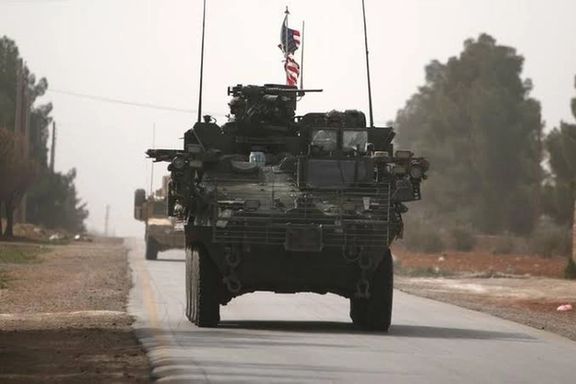
Amir-Abdollahian also condemned Israeli air strikes on targets in Syria and warned that these attacks would eventually face retaliation.
“I would like to strongly condemn the miserable attacks of the fake Israeli entity against Aleppo international airport and civilian areas in Syria and I confirm that the criminal practices by the Zionist entity in the region will not remain without retaliation.”
Israel has carried out hundreds of strikes on targets inside government-controlled parts of Syria in recent years, but it rarely acknowledges or discusses the operations. Often the strikes target Iranian-backed armed groups and concentrations of Iranian weapons transferred to Syria.
Tehran has militarily and financially backed Bashar al-Assad’s government since 2011 when the Syrian civil war erupted. It has deployed its own military personnel, the Lebanese Hezbollah and thousands of militias from Afghanistan, Iraq and Pakistan to provide the manpower Assad lacked to fight against opponents.
Regarding Amir-Abdollahian’s possible visit to Hezbollah in Lebanon, a Tehran-based analyst close to the regime told ILNA news website that Iran’s renewed ties with Saudi Arabia is a topic of interest to the militant group. Massoud Assadollahi said that Hezbollah needs to coordinate its policies with Tehran amid media reports that the Islamic Republic might “abandon” its allies in the region as a concession to Riyadh. It is important for Hezbollah not to be affected by “psychological warfare,” he underlined.
The Iranian pundit also pointed out that this is a critical time for Hezbollah amid heightened tensions with Israel and Prime Minister Benjamin Netanyahu’s threatsagainst militant Palestinian and Hezbollah leaders.
The Iranian foreign minister’s visit to Beirut would enhance mutual understanding with Hezbollah in face-to-face discussions, he argued, and added that when Amir-Abdollahian travelled to Saudi Arabia earlier in August, an Iranian foreign ministry official also visited the Hezbollah in Lebanon.
Assadollahi also linked the foreign minister’s trip to Syria to his earlier travel to Saudi Arabia. “After some time elapsed from Amir-Abdollahian’s trip to Saudi Arabia, he travelled to Syria to inform the leaders of that country about the latest developments…” including the release of Iran’s frozen funds by the United States.
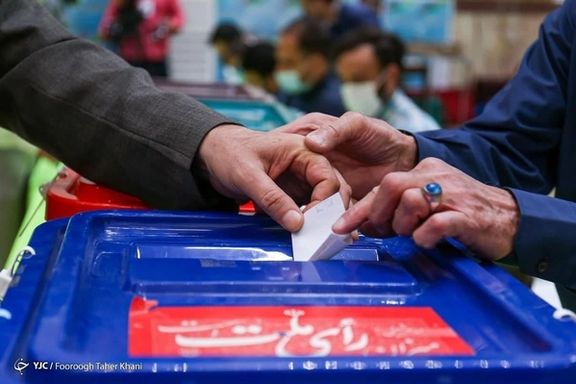
A former labor minister and leader of one of Iran's leftist Islamist groups has said the all-conservative government has failed to reach its economic objectives.
Mohammad Salamati, the head of the Islamic Revolution's Mojahedin Organization (IRMO), added in an interview with Rouydad24 website that the immense economic pressure on the people has made them politically indifferent. Salamati further attributed the government's failure to wrong policies as well as naivete and weakness of government managers.
Meanwhile, he called on the government and influential regime figures to pave the way for political participation rather than restricting people's choices before it is too late.
Salamati went on to say that the people are currently facing high inflation, unemployment and social restrictions including the government's heavy-handed control of the Internet and information dissemination. This, he said, has eroded people's hope and made them indifferent and reluctant to participate in the upcoming parliamentary elections in March.
"The Guardian Council’s vetting of the candidates and its discretionary supervision of the election has made the people certain that the vote is not going to change anything in Iran. It appears that a large part of those who hold political power in Iran do not believe in people's participation in determining their own fate," Salamati said. He was referring to mass disqualification of more moderate candidates in 2020 and 2021 elections.
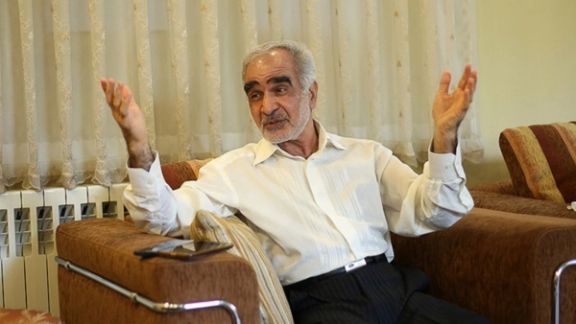
"Salamati added that "Only a competitive, free and fair election can restore people's trust in the government. It is only in that case, and with an improvement in the people's livelihood that they may be encouraged to participate in the elections." However, he said that "hard-headed officials are not capable of doing that."
Meanwhile, in a report about Iran's economic situation, Khabar Online website wrote last week that "The Raisi administration has failed to control the inflation rate and quoted an economist as saying that chronic high inflation will lead to the gradual deterioration of the country's infrastructures."
Iranian economist Mohammad Salimi Boroujeni told Khabar Online that the situation has left many businessmen with no motivation and reversed many conventional economic mechanisms.
The website wrote that Raisi’s promises about reducing the inflation rate to single digits have led to no tangible results and currently the inflation rate is around 47.5 percent at the start of the third year of Raisi's presidency.
However, some officials, including Economy Minister Ehsan Khandouzi even claim that the administration is ahead of its plans in controlling inflation and liquidity growth. He also promised that by March 2024, the inflation rate in Iran will be at its lowest point in five years.
At the same time, economic experts have told Khabar Online that Khandouzi's statement is contrary to what they see in terms of the people's livelihood and their purchasing power.
Boroujeni told the website that inflation has risen and the economic crisis has further deepened although the price of oil has remained stable, and officials claimed that the government's oil income is at a desirable level adding that according to them Tehran receives the oil money in cash.
The economist added that the government's handling of the economy has reduced people's purchasing power, increased poverty and inequality and damaged growth and production in the country.
Nonetheless, he said that the government is likely to come up with a bigger budget deficit by the end of the year. However, he added that financial discipline, a reduction in the government's expenses and wasteful activities, as well as increased transparency about the its financial operations can restore people's trust in the regime.
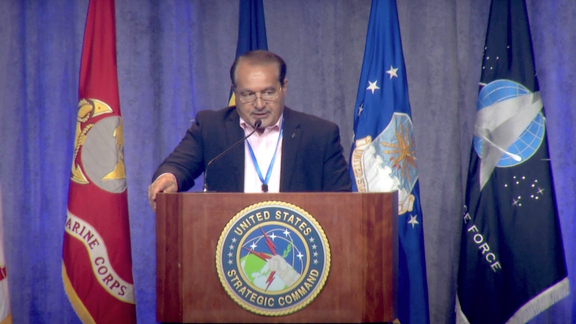
US military leaders hosting a controversial former Iranian diplomat as a keynote speaker in a strategic event has shocked and outraged many in the United States.
Princeton University faculty member Hossein Mousavian, who made headlines last year for bragging about the regime’s revenge against American officials over the targeted killing of IRGC's Quds Commander Qasem Soleimani, delivered a speech at the US Strategic Command’s Deterrence Symposium earlier in August. The US and EU-designated Soleimani coordinated Iran's proxy militant groups throughout the region to attack Israeli and US interests.
The Pro-Tehran pundit served as a key figure in Iran’s nuclear negotiations with the international community until 2005 and currently is a Middle East Security and Nuclear Policy Specialist at the Program on Science and Global Security at Princeton. Oddly enough, he used to be the editor-in-chief of the regime-affiliated daily Tehran Times, which recently published a “sensitive” US government memo purportedly sent to US Iran envoy Robert Malley informing him of his security access suspension.
Mousavian’s appearance at the mid-August high-level event, which came to light on Monday, drew criticism from former US officials and Iran analysts as well as Iranian dissidents, who questioned why America’s premier military outfit would host someone who maintains close ties to the Islamic Republic and has even indirectly lauded the regime’s efforts to assassinate American leaders.
In January 2022, his remarks in a documentary made in Iran to mark Qassem Soleimani’s second death anniversary led to controversy when he gloated about how Iran’s threat to avenge Soleimani killing frightened the wife of Brian Hook, Washington’s special envoy for Iran at the time. “An American told me that Brian Hook’s wife had not slept for several days and that she was shaking and crying. That’s how afraid they were” Mousavian said gleefully in the documentary.
Reacting to Mousavian’s presence at the event, Omri Ceren -- a journalist and the national security advisor for US Senator Ted Cruz (R-TX) -- pointed out that there are many US officials sympathetic to the Iranian regime.
"Mousavian helped lead the murderous Iranian regime’s efforts to obtain nuclear weapons so it could threaten the United States and our allies with annihilation," said Rep. Jim Banks (R-IN), a member of the House Armed Services Committee. "Now he’s in semi-retirement at Princeton as a full-time propagandist for the IRGC. Inviting him to spread lies at a US military seminar is insanity."
The former regime official started his speech at STRATCOM’s Deterrence Symposium 2023 noting that he was arrested in 2007 in Iran over charges of espionage for the US and was banned to hold any diplomatic post. However, former Foreign Minister Javad Zarif, one of the main architects of the 2015 nuclear deal, described him as an official committed to the regime who "continues to work hard" for Tehran’s interests while working at Princeton.
Mousavian, who traveled to Iran to attend Soleimani's funeral, was Tehran’s ambassador to Germany when four Iranian dissidents were assassinated at Berlin's Mykonos restaurant in 1992. In December 2021, an American academic who was imprisoned in Iran for 1,216 days, said Mousavian is sympathetic to the Iranian regime, claiming that he stymied efforts to free him from prison.
Gabriel Noronha, a former Iran adviser at the State Department, told the Washington Free Beacon, "The decision to invite former Iranian ambassador Mousavian to speak to STRATCOM is unimaginably foolish.
He is a pawn and propaganda agent of the Iranian regime, Noronha added. "Congress should investigate the decision-making process that led to this entirely inappropriate speaking invitation."
Alireza Nader, a US-based Iran scholar, said it is "outrageous and dangerous that US STRATCOM invited a former regime official connected to the assassination of Iranian dissidents to be a speaker at its symposium, providing him access to America’s most senior military officials."
During his remarks at the STRATCOM event, Mousavian thanked Gen. Anthony Cotton – the commander of the US Strategic Command -- for inviting him to the event and said he would present an "Iranian perspective" on the current threat landscape within the Middle East. The United States must "rewrite their policy in the Middle East," he added.
He went on to criticize what he called American acts of aggression towards Iran, highlighting former President Donald Trump's decision to withdraw from the 2015 nuclear deal. What he said was somehow the repetition of his views summarized in an article he penned for the Middle East Eye in 2020: Biden needs to revive the JCPOA, remove Iran’s Revolutionary Guard from the US terror list, and lift the sanctions against regime’s senior officials.
Describing him as “an agent of the Iranian regime,” Advocacy group United Against Nuclear Iran (UANI) called on Princeton last year “to dismiss him from any association or affiliation with the university without delay”, noting that “Mousavian’s affiliation with Princeton is a stain on the university’s reputation and credibility”.

Iran’s Ministry of Industry’s annual report has revealed a 17% decrease in online purchases and e-commerce transactions over the past Iranian year, ended March 20.
The report, produced by the Center for E-commerce Development, states that since March 2022, the number of transactions has fallen from approximately 3.6 billion to 3 billion transactions, potentially attributed to extensive internet disruptions and outages witnessed across Iran since September.
In June, the Tehran E-commerce Association sounded alarm regarding the "critical state" of internet quality in Iran, identifying the primary obstacle as "widespread and persistent disruptions affecting all IPs and websites."
A separate section of the report, delved into social network and messaging app preferences among e-commerce entities. Instagram emerged as the dominant player, commanding a substantial 55% usage share. However, since September, this popular social network has been banned in Iran.
Telegram, subject to filtering in Iran since 2019, secured the runner-up position with 41% of usage, while WhatsApp, also blocked since 2022, accounted for a 37% share.
This disruption comes in the wake of protests that began last year and are set to rise again on the anniversary of Mahsa Amini’s death in detention of the morality police.
Furthermore, amidst the backdrop of nationwide protests, a significant "80% of users within the country" have said they have to use VPN or proxy services to access social networks.






